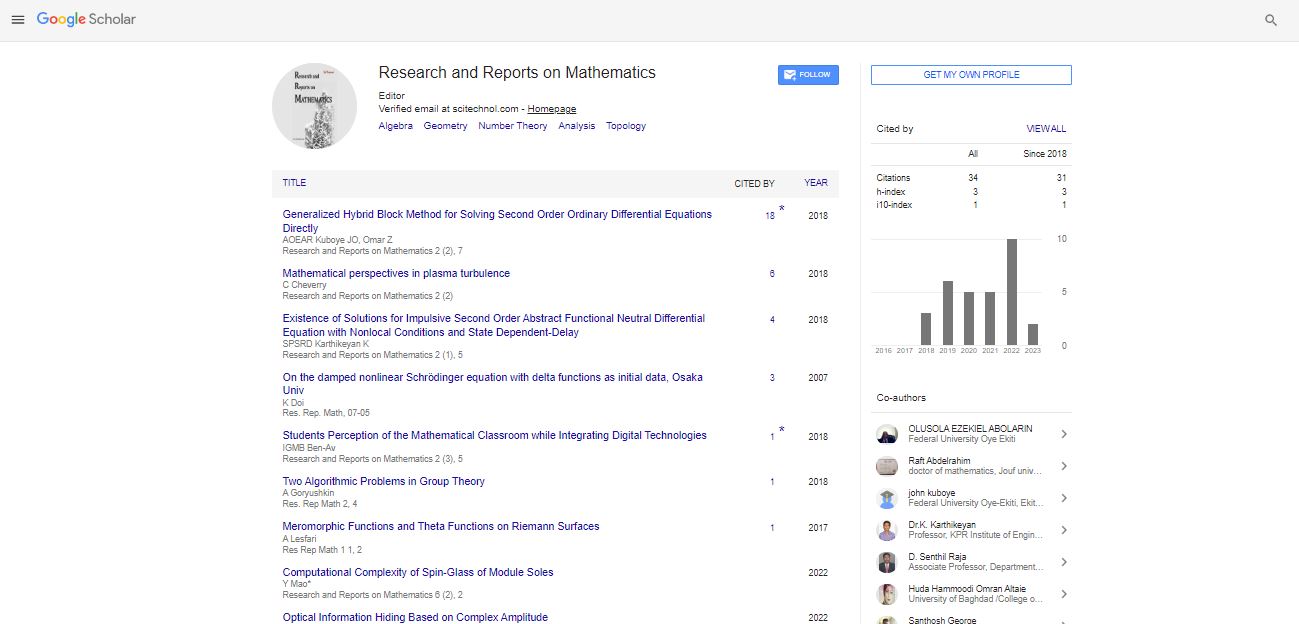Commentary, Res Rep Math Vol: 7 Issue: 4
Set Theory in the History of Mathematics
Sunkpal Guner*
1Department of Mathematics and Physics, Missouri University of Science and Technology, Rolla, USA
*Corresponding Author: Sunkpal Guner,
Department of Mathematics and
Physics, Missouri University of Science and Technology, Rolla, USA
E-mail: sunkpal.guner@cu.edu.cl
Received date: 28 July, 2023, Manuscript No. RRM-23-113487;
Editor assigned date: 30 July, 2023, Pre QC No. RRM-23-113487 (PQ);
Reviewed date: 14 August, 2023, QC No. RRM-23-113487;
Revised date: 23 August, 2023, Manuscript No. RRM-23-113487 (R);
Published date: 31 August, 2023, DOI: 07.4172/rrm.10001209
Citation: Guner S (2023) Set Theory in the History of Mathematics. Res Rep Math 7:4.
Description
Set theory is a foundational branch of mathematics that has played a pivotal role in shaping the development of the entire field. Its origins can be traced back to ancient civilizations, but its formalization and modernization occurred in the late 19th and early 20th centuries. The history of set theory, its key contributors, and its profound impact on mathematics will be discussed. The concept of sets and collections of objects can be traced back to ancient civilizations, including the Egyptians and Babylonians, who used various methods for counting and organizing objects. However, these early approaches lacked formal mathematical structure. The birth of modern set theory is often attributed to the German mathematician Georg Cantor (1845-1918). Cantor's work revolutionized mathematics and laid the foundation for set theory as a distinct discipline. Cantor introduced the concept of different sizes of infinity. He demonstrated that not all infinite sets are of the same size. He showed that the set of natural numbers (countably infinite) is smaller than the set of real numbers (uncountable infinite).
Cantor famously used a diagonal argument to prove that the real numbers cannot be put into one-to-one correspondence with the natural numbers. This result demonstrated the existence of uncountable sets. Zermelo-Fraenkel (ZF) set theory introduced axioms and rules that allowed for the construction of sets in a way that avoided paradoxes like Russell's. The ZF axioms included principles like the Axiom of Regularity, which prevented sets from containing themselves as members, and the Axiom of Choice, which deals with selecting elements from non-empty sets. ZF set theory remains the basis of contemporary set theory.
With ZF set theory in place, mathematicians began developing axiomatic set theories, such as Zermelo-Fraenkel set theory with the Axiom of Choice (ZFC). These theories provided a formal framework for the study of sets and became the standard foundations for most of mathematics. Set theory's influence extends far beyond its foundational role. It has become an indispensable tool in various branches of mathematics, Set theory is used to define topological spaces, open and closed sets, and concepts like convergence and continuity. The real and complex numbers are constructed using settheoretic methods, and concepts like limits, derivatives, and integrals rely on set theory. Set theory provides the basis for algebraic structures like groups, rings, and fields. Set-theoretic methods are used to study algebraic systems. Set theory and logic are intimately connected. Set theory is used to study the structure of mathematical propositions and the relationships between logical systems. Set theory plays a role in the development of geometric theories, such as axiomatic Euclidean and non-Euclidean geometries.
Set theory has a rich history that spans centuries, from its informal beginnings in ancient civilizations to its formalization and development as a foundational branch of modern mathematics. The challenges and paradoxes it posed led to the development of rigorous axiomatic systems like ZF set theory, which underpin virtually all of mathematics today. Set theory's influence extends beyond its foundational role, permeating various branches of mathematics and providing a framework for discussing the infinite and the abstract. As a discipline that continually raises profound questions and challenges intuitions about infinity, set theory remains at the heart of mathematical exploration and discovery.
 Spanish
Spanish  Chinese
Chinese  Russian
Russian  German
German  French
French  Japanese
Japanese  Portuguese
Portuguese  Hindi
Hindi 